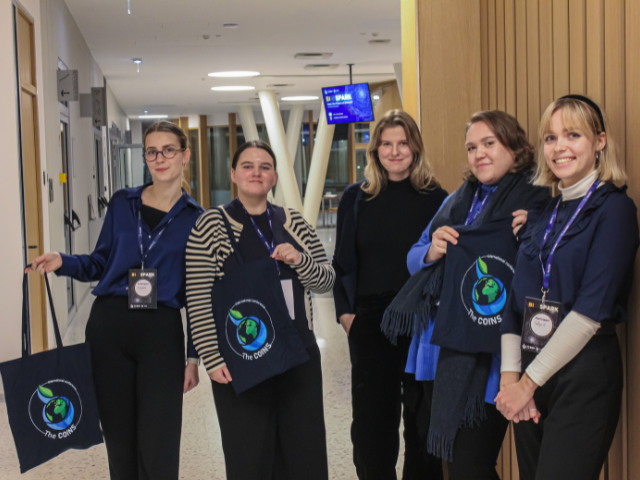In the field of life sciences, where innovation is not only a key to success but also a necessity, new challenges frequently arise. Companies often lack not only technical or scientific solutions but also the interdisciplinary collaboration that is essential for developing biotechnology, medical devices, and other complex projects. Biohackathons, such as “Biospark – Hack the Future of Biotech,” are among the initiatives addressing these challenges. This event, held on December 2–4 at the newly opened Vilnius University Medical Sciences Center, united life sciences students, researchers, and business representatives. It was organized by The COINS 2025 and BSV Ventures, with support from the National Cancer Institute (NCI), which presented one of the event’s challenges.
A space for innovation and collaboration
The event included lectures, workshops, and mentorship sessions over three days, encouraging participants’ creativity and delving into both scientific research and business processes. The opening session featured remarks by the Dean of the Vilnius University Faculty of Medicine, Prof. Dr. Dalius Jatužis, “The COINS 2025” director Aistė Židonytė, and Eglė Jašinskaitė from BSV Ventures.
On the first day, participants focused on scientific research and challenge analysis. Dr. Jonas Venius, Head of the Medical Physics Department at the NCI, presented the institute’s challenge. At the same time, mentors such as Dr. Stephen Jones and Miglė Gabrielaitė from the Life Sciences Center and Dr. Juras Kišonas, Head of the Radiotherapy Department at NCI and an oncologist, offered valuable insights.
During the second day, participants delved deeper into strategy development and market analysis. Investment specialist Erik Bhullar, Jokūbas Karnauskas from BSV Ventures, and other experts delivered talks on these topics. A panel discussion featured Jonas Juozapaitis, a junior researcher at the Life Sciences Center, and Eglė Jašinskaitė. Workshops were led by mentors from various fields, including Allergomedica CEO Tautvydas Gylis, BranchyDOSE co-founder Neringa Šeperienė, CoInvest Capital investment manager Matas Ramanauskas, Psylink CEO Laura Martinkutė-Korsakovė, and Delta Biosciences co-founder Dominykas Milašius. These specialists helped participants better understand market specifics and refine their business ideas.
On the final day, teams presented their solutions to a panel of judges that included The Ella Fund founder Erin-Gainer Grigaliūnaitė, Caszyme Business Development Manager Donatas Staniulis, DigitalDX Associate Partner Amit Goldman, and Karolis Stašys, Head of the Innovation and Technology Division at the Center for Physical Sciences and Technology.
Winners and awards
Team “Senso Life” emerged as the winner, earning the opportunity to participate in the BSV Ventures startup incubation program and the chance to secure up to €15,000 in funding. Meanwhile, representatives of the National Cancer Institute recognized team “Plexus” as having best addressed the institute’s challenge; their prize was a unique opportunity to observe a robot-performed surgery and try out the robot themselves. The COINS awarded the team “Splice Girls” a four-day invitation to the international conference on March 17–20.
Participants’ impressions
During the networking session after the awards ceremony, participants shared their impressions of the event's most memorable moments. Here are a few testimonials (team names were created during the hackathon):
“Senso Life”
“We really enjoyed the program, especially seeing what can be conveyed in just 60 seconds. The speakers were very professional and focused—this kind of lecture isn’t something you often get at university. We’re impressed that students can organize such a high-level event for young people. It truly inspires us to participate in more such initiatives.”
“Plexus”
“We came to the hackathon without a specific idea—just wanting to spend our time meaningfully and see what we could accomplish. We aimed to accept the challenge, develop a solid project, and gain experience. The most exciting part was that our team members came from different fields—physics, medicine, genetics, and molecular biology. This diversity became our strength. We loved the lectures and workshops, which were really inspiring and insightful. Discussions with researchers helped us refine our idea. The entire event was not only a meaningful experience but also a great opportunity for growth.”
“Splice Girls”
“The professional workshops gave life sciences students a chance to better understand the business side of their discipline, overcome fears, and learn to convey emotions to the team properly. It was also a unique opportunity to network with experienced mentors who shared valuable advice. We recommend participating in such events—they help you step out of your comfort zone, gain new knowledge, and find creative solutions to problems.”
“Novae Aetatis Biotech”
“The pitching workshops were instrumental. The moderators were demanding, which helped us break out of our comfort zones and push ourselves further. We learned much about robotic medicine in just two days—a field we hadn’t previously considered.”
Many participants see the hackathon as a beginning. Splice Girls announced that they received approval from their lab supervisors to continue developing their idea. At the same time, Senso Life plans to advance its project further and hopes to join the BSV Ventures accelerator program.
The future of innovation
Biospark clearly demonstrated how collaboration between science and industry can contribute to solving global challenges. Organizers hope these biohackathons will become more frequent, sparking innovation and strengthening Lithuania’s life sciences sector. “We all have ideas that we think about but never implement. Yet hackathons give us the time, space, and team to tackle targeted problems,” said Dr. Miglė Tomkuvienė, a researcher at the Life Sciences Center.
 |
